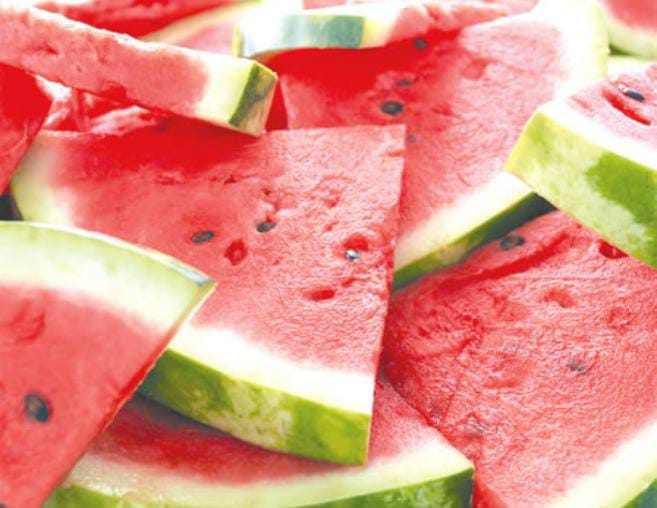It is common to experience morning sickness during pregnancy. This condition is generally harmless. While morning sickness can be quite uncomfortable, the inability to eat and/or drink normally, and daily living activities when the nausea and vomiting is extreme make many women describe it as one of their worst life experiences.
Even though it is called morning sickness, these bouts can occur at any time throughout the day or night. It usually starts between the first 4 to 6 weeks of pregnancy and gets better by week 14. Since nearly 75% of women experience morning sickness at some point during their pregnancy, there are many tried and true methods available to find relief, such as intake of watermelon.
In a new study, researchers suggested increased intake of watermelon following hospitalization for severe morning sickness, what is medically termed hyperemesis gravidarum.
The randomized trial was conducted in a university hospital from May 2019 to December 2020 found that adding watermelon to the diet of women with the severe type of morning sickness after hospital discharge improves body weight, morning sickness symptoms, appetite, wellbeing and satisfaction.
It was in the June edition of the journal, BMC Pregnancy and Childbirth.
In the study, 128 women at their discharge following hospitalization for hyperemesis gravidarum were randomized at the University Malaya Medical Center, Kuala Lumpur, Malaysia: 64 to watermelon and 64 to control arm. Women were randomized to consume watermelon and to heed the advice leaflet or to heed the dietary advice leaflet alone.
A personal weighing scale and a weighing protocol were provided to all participants to take home. Primary outcomes were bodyweight change at the end of week 1 and week 2 compared to hospital discharge.
Weight change metrics over the two weeks trial period following hospital discharge for hyperemesis gravidarum were significantly better for the watermelon arm both at the end of the first week and through to the end of the second week as hypothesized.
By the end of week 2, there was a 0.75 kg difference in weight change across trial arms, equivalent to body weight change of about 1.4%.
In addition, maternal satisfaction was higher and recommendation of intervention rate to friend or family of allocated intervention was also higher in the watermelon arm. The confluence of these findings points to a consistent positive impact of watermelon. However, on rehospitalization for HG, there was no difference.
However, the researchers declared: “The confidence building from watermelon “staying down” after being eaten may encourage the consumption of other food and drink and hasten recovery from severe morning sickness.”
Mrs Folasade Oladele, a nurse and Health Promotion Officer, Oyo State Ministry of Health, said women with nausea and vomiting because of the loss of body fluids can take a lot of fruits, including watermelon to replenish lost body fluid.
“They can take lots of fruits like watermelon, a little at a time so that they will not throw up. Besides this, they can have a bottle of water by their side from which they can seep little water at a time. Dry food items like biscuits, groundnut and salted popcorn can be taken based on what her body can tolerate.”
Dr Olugbade Omotajo, a public health physician and secretary of Ido Local Government Health Authority, declared that intake of fruits like watermelon, banana and oranges and other vegetables by women with severe nausea and vomiting is not dangerous to them and their unborn babies.
“The whole idea of suggesting intake of watermelon is because of its fruit sugars and high water content and the possibility of dehydration in a woman with morning sickness. When nausea and vomiting is severe, it is a cause of hospital admission for proper treatment. Dehydration in pregnancy, like every other person, is bad,” he said.
Anemia, preterm and very preterm birth, cesarean birth, low birth-weight or small for gestational age pre-eclampsia and eclampsia— a rare complication of preeclampsia that causes seizures during pregnancy — among other issues are possible pregnancy complications of severe morning sickness not promptly treated.
Researchers are looking at nutrition support, consequences of malnutrition and dehydration and the role of oral supplements, fortifying food and dietary measures to achieve nutritional requirements in women with severe morning sickness.
Besides in women hospitalized for severe morning sickness, bitter was most likely (32%) and sweet taste least likely (5%) to provoke nausea or vomiting on taste strip testing. Also, crunchy sweet uncooked food (apple or watermelon) was best tolerated.
In a food tasting trial in women hospitalized for severe morning sickness, apple and watermelon top the agreeability score and have the lowest nausea and emesis response rates amongst the food items consumed.
Watermelon has many benefits for pregnancy, ranging from reduced swelling and risk of pregnancy complications to relief from morning sickness to better skin. It eases heartburn and boosts the body’s immunity to infections, too.
Also, a 2018 study discovered that women who drank a juice—a mixture of watermelon, chayotes, and bananas had lower blood pressure than women who didn’t have the drink, suggesting that eating watermelon as part of this juice can help prevent and treat preeclampsia.
However, this can be said for all water-rich fruits or vegetables, including tomatoes, cucumbers, strawberries, zucchini, and even broccoli. Therefore, although technically accurate, this benefit is not exclusive to watermelon.






Leave a Reply